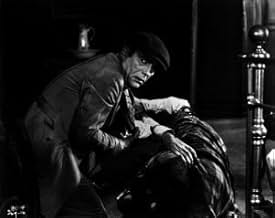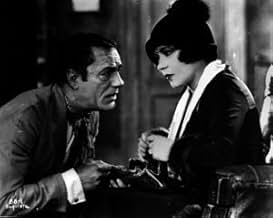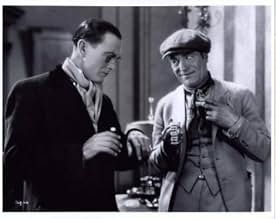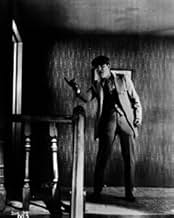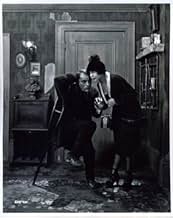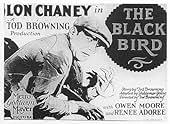PUNTUACIÓN EN IMDb
6,7/10
940
TU PUNTUACIÓN
Añade un argumento en tu idiomaTwo thieves, the Blackbird and West End Bertie, fall in love with the same girl, a French nightclub performer named Fifi. Each man tries to outdo the other to win her heart.Two thieves, the Blackbird and West End Bertie, fall in love with the same girl, a French nightclub performer named Fifi. Each man tries to outdo the other to win her heart.Two thieves, the Blackbird and West End Bertie, fall in love with the same girl, a French nightclub performer named Fifi. Each man tries to outdo the other to win her heart.
- Premios
- 1 premio en total
Andy MacLennan
- The Shadow
- (as Andy Maclennan)
Charles Avery
- Music Hall Patron
- (sin acreditar)
Lionel Belmore
- Music Hall Proprietor
- (sin acreditar)
Margaret Bert
- Minor Role
- (sin acreditar)
Peggy Best
- Minor Role
- (sin acreditar)
Louise Emmons
- Old Lady at Mission
- (sin acreditar)
Willie Fung
- Chinese Man
- (sin acreditar)
Fred Gamble
- Man Saying There's a Present for Fifi
- (sin acreditar)
Joseph Hazelton
- Man at Table in Music Hall
- (sin acreditar)
Cecil Holland
- Old Man at Mission
- (sin acreditar)
Bertram Johns
- Member of Bertie's Slumming Party
- (sin acreditar)
Argumento
¿Sabías que...?
- CuriosidadesThe Blackbird (Lon Chaney) was called The Mocking Bird in earlier versions of the film.
- Citas
Woman with Diamond Choker: I say... we are going down Plum Alley to see the Chinkies smoking.
West End Bertie: I say... shall we go?
- ConexionesFeatured in MGM: When the Lion Roars (1992)
Reseña destacada
Lon Chaney's twisted performance as the eponymous Blackbird is much fun, as he literally bends himself all out of shape to pretend himself his good, crippled brother, the Bishop. The tortuous melodrama and love triangles of the rest of the film, however, leaves much to be desired. At least, with a Chaney and Tod Browning collaboration, one is bound to be treated to something at least a little offbeat, and such is the case in "The Blackbird," although it doesn't quite reach the level of their better films, such as "The Unholy Three" (1925) and "The Unknown" (1927), although its ironic twist of fate, or double deception, anticipates the latter.
Besides Chaney's physically-demanding dual roles, there are a couple things I appreciate about this one that reinforces his performance. One is the play-within-the-play puppetry. Blackbird's love interest played by Renée Adorée is a vaudeville performer whose face is superimposed over the pliable body of the puppet, the effect not only being actually a film-within-a-film with the multiple-exposure trick--a photographic technique rather than a theatrical one--but also to mirror Chaney's physical transformations. Adorée's stage performance being explicitly a trick calls attention to the doubled deception supposedly off-stage by Chaney--that of his fooling fellow characters and that of the few moments on screen where he doesn't share the deception with the spectator. Even though the photoplay spends too much time on Chaney and the rest lounging about at the club's bar doing not much of anything and even taking time out for Blackbird to intimidate an interracial couple and for a couple of intertitles to include a racial slur against Chinese characters, I do appreciate the reflexivity of the play-within-play, or film-within-film puppetry.
The other interesting aspect is Owen Moore's character. Whereas Chaney's Blackbird/Bishop continues a charade, including going in and out of his room to change personas as if anticipating Clark Kent going into phone booths to reveal his Superman costume, to maintain his "true identity" as a lowly thief by the protection of his respectable alter ego, Moore's "West End Bertie" has completely adopted his respectable persona as a dandy while still carrying out thefts--and, more than that, he exploits the character for the purpose of stealing from his upper-class acquaintances. The love triangle stuff is bland, especially when an old lover of Blackbird's is thrown in the mix, but the initial fascination and rivalry expressed by Chaney when Moore's character is fully revealed to him is compelling.
If one gets past some particularly bad pacing and overdone melodrama for this Browning-Chaney collaboration, or that Adorée's performer turns out to be disappointingly featherbrained and Moore's monocle-wearing dandy none too interesting, either, after his initial confrontation with Chaney's Blackbird, there's clever, reflexive play going on here. On stage in the puppetry and off-stage in the criminal deception and anchored by Chaney's unparalleled bodily versatility, it's a film about characters who pretend to be something else--actors playing actors--and about the malleability and illusory quality of cinema.
Besides Chaney's physically-demanding dual roles, there are a couple things I appreciate about this one that reinforces his performance. One is the play-within-the-play puppetry. Blackbird's love interest played by Renée Adorée is a vaudeville performer whose face is superimposed over the pliable body of the puppet, the effect not only being actually a film-within-a-film with the multiple-exposure trick--a photographic technique rather than a theatrical one--but also to mirror Chaney's physical transformations. Adorée's stage performance being explicitly a trick calls attention to the doubled deception supposedly off-stage by Chaney--that of his fooling fellow characters and that of the few moments on screen where he doesn't share the deception with the spectator. Even though the photoplay spends too much time on Chaney and the rest lounging about at the club's bar doing not much of anything and even taking time out for Blackbird to intimidate an interracial couple and for a couple of intertitles to include a racial slur against Chinese characters, I do appreciate the reflexivity of the play-within-play, or film-within-film puppetry.
The other interesting aspect is Owen Moore's character. Whereas Chaney's Blackbird/Bishop continues a charade, including going in and out of his room to change personas as if anticipating Clark Kent going into phone booths to reveal his Superman costume, to maintain his "true identity" as a lowly thief by the protection of his respectable alter ego, Moore's "West End Bertie" has completely adopted his respectable persona as a dandy while still carrying out thefts--and, more than that, he exploits the character for the purpose of stealing from his upper-class acquaintances. The love triangle stuff is bland, especially when an old lover of Blackbird's is thrown in the mix, but the initial fascination and rivalry expressed by Chaney when Moore's character is fully revealed to him is compelling.
If one gets past some particularly bad pacing and overdone melodrama for this Browning-Chaney collaboration, or that Adorée's performer turns out to be disappointingly featherbrained and Moore's monocle-wearing dandy none too interesting, either, after his initial confrontation with Chaney's Blackbird, there's clever, reflexive play going on here. On stage in the puppetry and off-stage in the criminal deception and anchored by Chaney's unparalleled bodily versatility, it's a film about characters who pretend to be something else--actors playing actors--and about the malleability and illusory quality of cinema.
- Cineanalyst
- 29 oct 2020
- Enlace permanente
Selecciones populares
Inicia sesión para calificar y añadir a tu lista para recibir recomendaciones personalizadas
Detalles
Taquilla
- Presupuesto
- 166.000 US$ (estimación)
- Duración1 hora 26 minutos
- Color
- Mezcla de sonido
- Relación de aspecto
- 1.33 : 1
Contribuir a esta página
Sugerir un cambio o añadir el contenido que falta

Principal laguna de datos
By what name was Maldad encubierta (1926) officially released in India in English?
Responde

